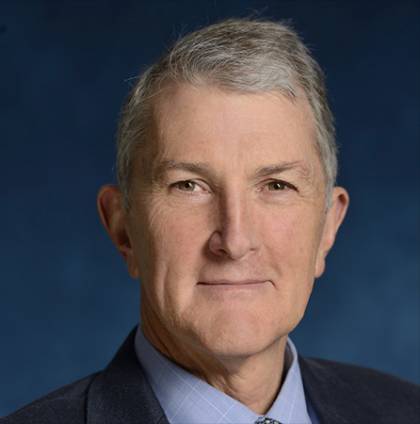Andrew Douglas, a professor of mechanical engineering and vice dean for faculty at the Whiting School of Engineering, has been appointed Johns Hopkins University's next vice provost of faculty affairs, Provost Sunil Kumar announced in a message to university leadership today. He will assume the role on July 1.

Image caption: Andrew Douglas
Douglas has been a Johns Hopkins faculty member since 1983 and holds a joint appointment in Biomedical Engineering. He served as chair of the Mechanical Engineering Department from 1997 to 1999 before being named associate dean for academic affairs at the Whiting School. He also served twice as interim dean, from 2003 to 2004 and again in 2013, before the arrival of Dean Ed Schlesinger.
"Andrew brings significant institutional knowledge and a deep understanding of the landscape of higher education to his new role," Schlesinger said. "His dedication to the university and to making a difference, such as the great strides he has made in increasing diversity among the Whiting School faculty, now will benefit the entire institution."
The Office of Faculty Affairs works closely with university leadership and faculty members across the university to advance and promote their work. The vice provost for faculty affairs partners with colleagues in the university's nine schools to ensure the continued excellence of Johns Hopkins faculty by enhancing faculty development initiatives; increasing faculty diversity; and building a strong, inclusive, and collaborative faculty community.
Douglas will succeed Susan Courtney-Faruqee, a brain scientist who will return full time to her research lab and faculty positions within the university's Krieger School of Arts and Sciences and School of Medicine.
In her two years as vice provost, she led an effort to develop a new institutionwide policy governing the potential conflicts between academic and professional influence and personal relationships among faculty, staff, and students. She also advanced key priorities within the Faculty Diversity Initiative, helped schools translate data from the COACHE faculty satisfaction survey into meaningful action plans, elevated and improved faculty mentoring programs across the university, helped organize a meeting of departmental leaders in the summer of 2018 to bring the issue of faculty mentoring to the forefront, and oversaw the creation of the university's Dual Career Program.
"I am grateful to Susan for her leadership and service to the university over the past two years to address pressing issues facing our faculty and increase collaborations across Johns Hopkins," Kumar wrote.
"Andrew is an outstanding scholar, teacher, and collaborative leader," he added. "His past experience and deep knowledge of the university make him ideally suited for this important position in the Provost's Office."
Douglas earned bachelor's and master's degrees in civil engineering from the University of Cape Town, South Africa, and a master's and PhD in solid mechanics from Brown University. At Hopkins, he is a past recipient of the William Huggins Award for excellence in teaching and the Dunn Family Award, which recognizes extraordinary impact on the lives of undergraduate students.
His research focuses on soft biological tissues and organs such as the heart and tongue. Current research areas in his lab include the nonlinear mechanics of solids, the mechanical response of compliant biological tissues, finite deformation elasticity, and the static and dynamic fracture of ductile materials.
"I got into academic administration because I'm passionate about faculty governance," Douglas said. "Like Susan, I was happily doing my research and teaching when asked to serve as chair of Mechanical Engineering. Within two years of taking that role, I was asked to be associate dean for academic affairs in the Whiting School. I kept going because there was always more to do for the faculty and our students, particularly as the school has grown in size and stature.
"I have a deep appreciation for the quality of the faculty across JHU," he added, "and I'm looking forward to getting to know far more about all of the schools."
Posted in University News, News+Info
Tagged university administration







